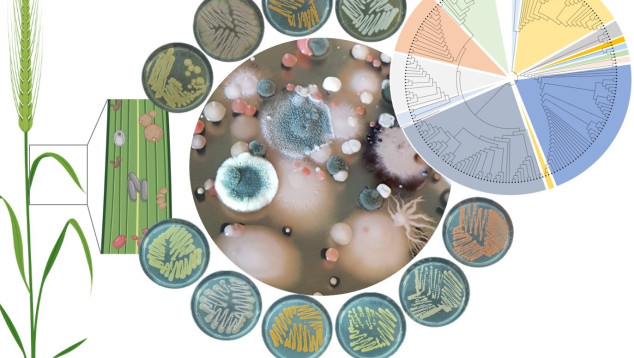PhD position: Ecology and Genomics of Phyllosphere Yeasts
PhD position: Ecology and Genomics of Phyllosphere Yeasts
Microbial EcologyContact Person:
Droevendaalsesteeg 10
6708 PB Wageningen
The phyllosphere - the aerial parts of plants - harbors a rich and diverse microbial community, including bacteria, filamentous fungi, yeasts and viruses. This environment is both harsh and dynamic, exposing microbes to a range of biotic and abiotic stresses (e.g. low nutrient availability, ultraviolet radiation, temperature and humidity oscillations, toxic compound exposure). Yeasts have diverse ways to cope with these conditions and compete with plant pathogens, providing protection. To date, the adaptive traits and competitive mechanisms by which yeasts colonize the phyllosphere remain largely unknown.
What will you be doing?
You will be joining the MiCRop consortium (Microbial Imprinting for Crop Resilience) aimed at harnessing the genomic potential of plant-associated microbes as a new platform for improved stress resilience of future crops and sustainable food production.
In this project, we will leverage our recently established ‘Phyllosphere Yeast Repository’ - an extensive collection of yeast isolates, genomes and metabolomes – to assess: (i) competition and cooperation in the phyllosphere, and (ii) the potential of yeasts to control phyllosphere pathogens. You will conduct laboratory and greenhouse experiments to investigate yeast-plant and yeast-pathogen interactions in the phyllosphere. To achieve this, you will adopt a combination of classical microbiology techniques (cultivation, microscopy), chemical analyses (gas chromatography), molecular biology (qPCR, metabarcoding, transcriptomics, yeast mutagenesis), plant bioassays, and a range of bioinformatics analyses (genome mining, comparative genomics, multi-omics integration).
What will you be contributing?
- Perform lab and greenhouse experiments focused on yeast-plant and yeast-pathogen interactions
- Integrate experimental findings using bioinformatics to analyze multi-omics data, linking microbial functions to ecological performance
- Closely collaborate with MiCRop team and the WUR Bioinformatics Group
- Present your research at national and international conferences, and publish in peer-reviewed scientific journals
- Supervise HBO and MSc students
- Contribute to maintaining a friendly, inclusive and collaborative working atmosphere within the research group
What skills do you bring in?
- A Master’s degree in (molecular) microbiology, microbe-plant interactions, microbial ecology or a related field
- Experience in molecular microbial ecology and bioinformatics, with a strong interest in combining lab-based experimentation with computational analysis
- Desirable technical skills: microbiological cultivation techniques, mutagenesis (CRISPR-Cas), microscopy, next-generation sequencing, and multi-omics analyses (genomics, metabolomics, genome-scale metabolic modeling)
- A proactive, enthusiastic and solution-oriented mindset
- Strong organizational and communication skills in English, both written and spoken
What do we offer?
A fully funded 4-year PhD position (1.0 FTE) within the vibrant department of Microbial Ecology, with a preferred starting date of September 15th, 2025. You will be based at NIOO-KNAW and part of a multidisciplinary team within the MiCRop consortium. In addition, you will collaborate with colleagues from WUR Bioinformatics Group and have access to both cutting-edge lab facilities and advanced computational resources. The position also offers valuable opportunities for professional growth, including teaching experience, science communication, and building a national and international research network.
Your workplace
You will be appointed at the Department of Microbial Ecology of the Netherlands Institute of Ecology (NIOO-KNAW) located in Wageningen. For detailed information on the Microbial Ecology Department, please visit our website: Microbiële Ecologie | Nederlands Instituut voor Ecologie (NIOO-KNAW)
For more information
Questions regarding this position can be directed to Dr. Viviane Cordovez (v.cordovez@nioo.knaw.nl), Department of Microbial Ecology (NIOO-KNAW).
Application procedure
For the application, please provide a curriculum vitae and cover letter summarizing motivation and experience. The deadline for applications is June 22nd, 2025.
About NIOO
The Netherlands Institute of Ecology (NIOO) is a national research institute of the Royal Netherlands Academy of Arts and Sciences (KNAW). At NIOO we perform ecological research on biodiversity, climate change and sustainable use of land and water. We stimulate ecological research in the Netherlands and share our ecological knowledge with society. Everyone in our organisation is passionate about contributing to a sustainable world from their own area of expertise.
Terms of employment
Depending on education and experience the minimum salary is 2.901 and the maximum salary is 3.707 gross per month for a full-time appointment (scale P cao Nederlandse Universiteiten/KNAW). This is exclusive of 8% vacation allowance, 8.3% year-end bonus, travel allowance, internet allowance, home working allowance and pension accrual with ABP.
The KNAW offers its staff an excellent package of secondary benefits. A package that meets the different needs of employees depending on their stage of life, lifestyle or career ambitions. For example, by working an extra two hours a week, it is possible to increase the number of days off from 29 to 41 days a year (with full-time employment).
For a complete overview of the terms of employment, please refer to the web page: work for the Academy.
Applying for a Certificate of Good Conduct can be part of the employment procedure.
Diversity & Inclusion
The KNAW considers a working environment in which everyone feels welcome and appreciated of great importance. A working environment in which attention is paid to individual quality and where development opportunities are paramount. Together we strive for an inclusive culture in which we embrace differences. We would therefore like to invite candidates who want to contribute to this through their background and experience. In the event of equal suitability, preference will be given to the candidate who thus enhances diversity within the Academy.
We will not respond to any supplier enquiries based on this job advertisement.

